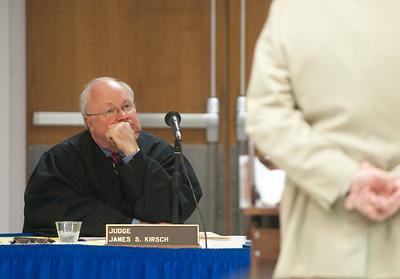
Indiana State University students listened and learned as they observed attorneys argue a case before the Indiana Court of Appeals Thursday morning (March 26).

Indiana State University students listened and learned as they observed attorneys argue a case before the Indiana Court of Appeals Thursday morning (March 26).
Indiana State University students listened and learned as they observed attorneys argue a case before the Indiana Court of Appeals Thursday morning (March 26).
The three judge panel of Patricia Riley, James Kirsch and Margret Robb journeyed to the university campus as part of the appellate court's program that takes the court "on the road" giving Indiana residents opportunities to see the legal system in action.
"Students get to see something in action that they've studied for four years," said Robert Van Sickel, ISU associate professor of political science and director of the legal studies program. "They get to see what actually happens. The vast majority of people never get to see a trial court. Even less get to see an appellate court."
Carly Robbins, a senior political science major from Bridgeton, N.J., was one of the students who gathered in Hulman Memorial Student Union's Dede II to listen a case appealed out of Marion County regarding whether the trial court erred in admitting evidence obtained by police during a warrantless search of a hotel room.
"The case was very interesting; there were some good law issues," said Robbins, who intends to apply to law school. "Fourth Amendment cases always interest me because of issues of privacy."
Brian Montgomery, who was convicted of the class A felony dealing in cocaine, claims there was neither valid consent to the search nor exigent circumstances justifying the entry of his hotel room. Attorneys Stephen Gray and Todd Ess argued for Montgomery while Tiffany Romine with the Indiana Attorney General's Office argued for the state.
The state's case against Montgomery began after officers entered his hotel room on a welfare check and they found cocaine. They went to his hotel room after Montgomery's girlfriend led officers on a high speed chase in the direction of the hotel. The girlfriend told officers "bad people" were after her and her boyfriend and she was afraid they were going to do him harm. The girlfriend gave officers the key to the hotel room she shared with her boyfriend.
In addition to citing various other court cases in his argument, Gray said officers had nothing to back up the girlfriend's unspecified concerns for her boyfriend.
"There was nothing to show this woman had any reliability," he said.
Romine said under the totality of circumstances, the officers believed Montgomery was in danger.
"Police also have a caretaker role," she said. "They entered to determine the defendant's well-being. For all they knew he could have been bleeding, he could have been held hostage."
The judges will issue their opinion at a later date.
After listening to the arguments, the judges and attorneys spoke to the audience and answered questions.
When asked if the case they heard Thursday could be appealed to the Indiana Supreme Court, Kirsch said that court chooses what cases it will hear.
"We decided 2,700 cases last year, of those about 80 went to the (Indiana) Supreme Court," he said. "There's a narrowing down of cases as about 2 million cases were started in trial court in Indiana last year."
The attorneys also spoke about the need for good writing skills as an attorney or a judge.
"When students start law school they think briefs have to contain a lot of legalese, to sort of speak in code, but you don't," Robb said. "You need clarity. You need to get us from point A to point C so that we understand it."
"It's possible to think well and not write well," Kirsch added. "It's impossible to write well without thinking well."
The judges also spoke of their routes to the bench and what is important to study in school.
Robb said she believes in a classical education with debate, persuasion and rhetoric, and that general learning will occur during a law practice.
"That's what makes law fun is that you learn so much stuff when your clients come to you with an issue," she said.
Van Sickel said the Court of Appeals began visiting ISU in 2001 and that the sessions fit ISU's mission of experiential learning.
"The students are getting practical experience in how the court works," he said.
Robbins, who listened to a case during a previous session held at ISU, agrees.
"We're very lucky they keep coming here," she said.
-30-
Contact: Bob Van Sickel, Indiana State University, associate professor of political science and director of the legal studies program, at 812-237-2503 or rvansickel@isugw.indstate.edu
Writer: Jennifer Sicking, Indiana State University, assistant director of media relations, at 812-237-7972 or jennifer.sicking@indstate.edu
Photo: http://isuphoto.smugmug.com/photos/499303434_mx4ay-L.jpg
Cutline: Indiana Court of Appeals Judge James Kirsch listens as attorney Stephen Gray makes the argument for his client in a case heard on the Indiana State University campus Thursday (March 26).
Photo: http://isuphoto.smugmug.com/photos/499303268_YdMXT-L.jpg
Cutline: Indiana State University students listen to oral arguments before the Court of Appeals, which was at the university's campus on Thursday (March 26). ISU Photo/Tony Campbell